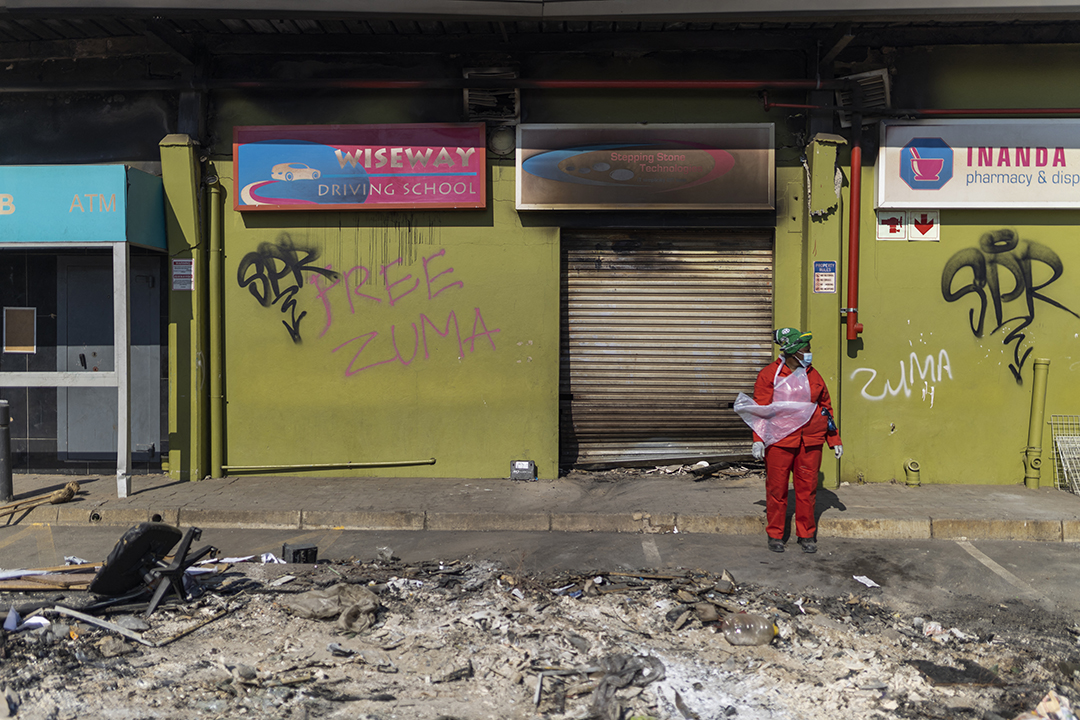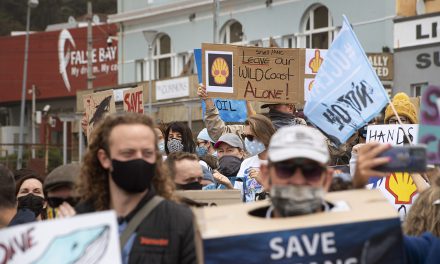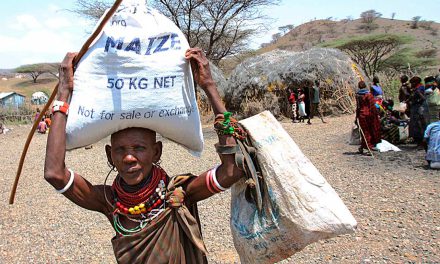
A cleaning operation of the Dube Village Mall in Durban, after the area was severely affected for several days by looting and unrest. Photo: Guillem Sartorio/AFP
Among the G20 group of countries, only South Africa is expected to fall short of reaching pre-COVID-19 growth levels by 2022, according to the Economist Intelligence Unit (EIU). Twenty-seven years after South Africa’s transition to democracy, the country saw the start – on 8 July 2021 – of an unprecedented spate of violent protesting and looting. The looting was limited to two major provinces, Gauteng, and KwaZulu-Natal. This eruption has left KwaZulu-Natal with an estimated cost to gross domestic product of approximately R20 billion ($ 1.4 billion) in terms of inventory losses, property damage, and foregone exports. Amid the unrest, thousands of people were left unemployed, many residents lost their sources of income and capital required to access essential services that enhance their livelihoods.
Many South Africans were already living in dire poverty under difficult economic conditions before the insurrection. Local economies were characterised by massively unequal access to socio-economic resources. Living conditions for South Africans have also worsened since the onset of the Coronavirus pandemic. Recent criminal activities of opportunistic looting have exacerbated these pre-existing dynamics. During this unrest, however, we saw different communities in South Africa standing together and protecting their properties and local businesses from looting and destruction.
Nonetheless, and though a relative peace appears to have returned to the country, many people are still left with unanswered questions:
- What does the unrest and violence mean for South Africa’s future?
- What are the full implications for the economy?
- What are the likely knock-on consequences?
- Does this affect the entire country or just these two provinces, and what will full recovery of these economies look like in practice?
To answer these questions as robustly as possible (given that it is too early to estimate the full effect), I have run an econometric regression that demonstrates the relationship between a number of variables and their impacts on GDP performance. Each of these variables have been negatively affected by both the governance response to COVID-19, and then more acutely, by the July insurrection.
Due to the destruction unleashed in July, consumers and businesses will be negatively affected for some time, which adversely affects spending behaviour. Both KwaZulu-Natal and Gauteng have suffered losses in consumption and the production of goods, both of which contribute directly to GDP. While some businesses were minimally affected by the violence, in certain parts of the country both formal and informal business sectors were forced to close permanently.
The impact on businesses and the impact of the collateral damage on production capacity, infrastructure, and other facilities will be felt in the long run. There has been significant distortion to supply chain logistics within the country, as well as to international trade. Durban and Richards Bay harbour activity virtually ceased during the unrest. Due to instances of panic buying and road closures, there have also been food, fuel, and even medicine shortages in some parts of the country. Certain key products have been temporarily unavailable, leading to price increases. Fixed investments, especially in the private sector, have continued to be adversely affected well beyond the initial shock to the economy, as negative international media coverage further eroded South Africa’s reputation as an attractive investment destination.
The July insurrection exploded partially as a culmination of at least a decade of political uncertainty and economic stagnation, during which corruption and crumbling state capability was rampant. Sovereign credit ratings were, for instance, already dire by the time of the July mayhem. The looting and its aftermath have negatively impacted the value of the rand, from an average of R13,90 to US$1 in June to an average of R14,60 to US$1 in July. While the looting is not primarily responsible for dictating the direction of the rand, it has clearly contributed to the recent depreciation. Sudden rand depreciation, if not swiftly corrected, drives import-driven inflation. Necessities such as fuel become relatively and rapidly more expensive. This has a multiplier effect, as it drives the prices of all consumer goods up and erodes disposable income. Interest rates are typically adjusted upwards to try and stem inflation, which in turn dampens spending in the economy.
One of the most concerning long-term impacts of the rioting, therefore, is that it will reduce tax revenue available to the state. Because many businesses have suffered losses, with some closing and others shedding jobs, both corporate and personal income tax payments will be diminished. Regardless of how the government intends to proceed, the additional expenditure required to recover from both the impact of COVID-19 and the looting was not budgeted for.
Combined with revenue shortfalls, any government expenditure will increase the fiscal burden and will likely increase the country’s external debt to GDP ratio. If unaccompanied by productive growth in the economy, this is likely to further erode the country’s standing with global credit rating agencies. While confidence levels for both corporate South Africa and households were already fragile and just beginning to recover, the intensity of the recent unrest means that this is likely to dampen again, with subsequent negative impact on spending and investment.
Regression Analysis
As mentioned above, KZN alone is currently estimated to have lost R20 billion as a result of the July insurrection. However, this figure doesn’t account for the likely future losses associated with it in terms of future GDP growth, nor does it capture the nationwide impact of KZN’s losses. Below is the regression model that shows the general nature of the relationship between GDP growth (Dependent Variable) and several related independent variables (IVs) that typically influence growth. The model does not yet attempt to capture the effects of looting, as it is still too early to read the full effects, but ultimately attempts to determine the nature and direction of what the future implications for GDP may be when explanatory variables are highly impacted. Multiple linear regression is employed and controls for potential explanatory variables such as changes in private consumption expenditure, government expenditure, foreign direct investment, and exports. The data is in real numbers (millions or billions), so a unit change is used for IVs to explain the percentage change in the dependent variable.
Data collection
Time-series data collected from the South African Reserve Bank is employed in the model. It includes quarterly data for GDP (GDP at current market prices denoted in rands); private consumption expenditure; government expenditure; foreign direct investment; and the exports of goods and services from 2001 up until 2021 first Quarter.
Model
Multiple linear (ML) regression is used to understand relationships between a dependent variable (GDP) and potential explanatory variables (Consumption, Government expenditure, Investment And exports). Below is the mathematical depiction of the model:
Y = B0 +B1x1 + B2x2 + …..+BpXip +u
- y = GDP
- x1 = Consumption
- x2 = Expenditure
- x3 = Investment
- X4 = Net exports
- B0 = y-intercept at time zero
- B1 = regression coefficient that measures a unit change in the dependent variable when x1 changes – the change in GDP when Consumption changes.
- B2 = coefficient value that measures a unit change in the dependent variable when x2 changes—the change in GDP when Government expenditure changes
- B3– coefficient value that measures a unit change in the dependent variable when x3 changes—the change in GDP when Investment changes
- B4– coefficient value that measures a unit change in the dependent variable when x3 changes—the change in GDP when Net Exports changes
| lm(formula = y1 ~ x1) | |||||
| Residuals: | Min | 1Q | Median | 3Q | Max |
| – 101280 | -11986 | 842 | 11674 | 57293 | |
| Estimate | Std. Error | t value | Pr(>|t|) | ||
| (Intercept) | 5,9 | 4,5 | 13,23 | <2e-16 | *** |
| x1Expenditure | 6,2 | 2,3 | 26,06 | <2e-16 | *** |
| x1Consumption | 3,04 | 1,3 | 2,23 | 0,029 | * |
| x1Exports | 4.08 | 5,6 | 7,26 | 2,15e-10 | *** |
| x1Investment | 1,16 | 6,9 | 1,6 | 0.2614 | |
| Signif. codes: 0 ‘***’ 0.001 ‘**’ 0.01 ‘*’ 0.05 ‘.’ 0.1 ‘ ’ 1 | |||||
|
Residual standard error: 22250 on 80 degrees of freedom |
|||||
| (279 observations deleted due to missingness) | |||||
| Multiple R-squared: 0.997 |
Adjusted R-squared: 0.9969 |
||||
| F-statistic: 6692 on 4 and 80 DF, p-value: < 2.2e-16 | |||||
Interpretation
- The level of GDP is estimated to increase by 6.2% if government expenditure increases by one unit and if all the other variables are held constant. Increase in government spending increases aggregate demand, which may further stimulate the economy and employment. However, this may sometimes lead to a fiscal deficit if government expenditure exceeds the budget plan due to current expenses, or unproductive expenditure exceeds the economy’s ability to generate sufficient tax revenue. This in turn can stifle private investment.
- The model shows that the value of GDP will increase by 3.04 % in response to a 1 unit rise in private consumption expenditure, if all the other variables are held constant. GDP is heavily reliant on consumption. Companies doing business with the intention of maximising profits will, in the aftermath of the looting, have to employ fewer employees at lower wages. The resultant loss of disposable income in the economy will lead to a reduction in consumption expenditure, which will also result in overall corporate and personal income tax revenue losses. In turn, this reduces the ability of the state to spend responsibly. As seen above, this will negatively affect spending that could otherwise boost aggregate demand.
- The price of GDP will increase by 4,08% following a 1 unit rise in exports if the other variables remain constant. The nation will have a positive balance of trade if the value of its exports exceeds the value of its imports. As a result of significant distortion to supply chains within South Africa, and the resultant ability to trade with the rest of the world, there are high expectations of negative net exports. Exports also earn much needed foreign exchange, much of which will now be foregone in the aftermath of the looting.
- R-squared indicates that 99% of the variations in the GDP can be explained by changes in expenditure, consumption and exports.
Conclusion
The data in the model runs up to the first quarter of 2021. The July looting (second quarter) has clearly had a negative impact on all the variables denoted in the model, which strongly suggests that the long-run impacts on future GDP growth will be negative, a hypothesis that will be tested after sufficient time has passed. Regression analysis has shown that government expenditure can drive aggregate demand but it has to be done responsibly and productively. For consumption, the model has shown sizeable effects.
Consumption expenditure is likely to be impaired due to the looting, which in turn has negative effects on corporate and personal income tax revenues, which then limit the state’s ability to spend responsibly. Also, for exports, the model has shown that aiming for a positive balance of trade can really improve a country’s economic prowess. Significant distortions to supply chains within South Africa, as well as trade with the rest of the world, will likely lead to an exacerbated negative trade balance in the near future.
In the third quarter, South Africa’s economy was expected to fall by 3% due to the July unrest, according to a Wall Street bank report. According to a Bloomberg survey, the gross domestic product will expand by 4.2% in 2021 versus a previous forecast of 4.5%. While this matches the central bank’s forecast, the economic damage caused by July’s unrest could nullify the improvement and have a prolonged adverse impact on job creation and investor confidence. In addition, electricity supply constraints could restrict the production sector’s expected recovery which has been estimated to only occur by 2023.
In general, economic destruction is simply a step backward in human society’s battle to meet an ever-growing list of wants and needs with limited resources. It is necessary to examine the tools available to assist societies to mitigate the after effects of the July insurrection and to prevent another one from occurring. People are predictable in their responses to positive and negative incentives, so the fundamental question at hand should be how to allocate resources in the most productively efficient manner that will best serve citizens in the long run.
Sixolile Ngqwala holds a Master of Commerce (MCom) in Economics from the University of Fort Hare, where he worked on the National Income Dynamics study (NIDS), based at the University of Cape Town, for Econometric research (econometric modelling, data coding, data mining, data analysis and interpretation). Sixolile has two BCom undergraduate degrees (in economics and in business financial management and industrial psychology). For his BCom Honours he majored in econometrics and economics. He has multidisciplinary skills, including an intersection of machine learning and data science (PYTHON and R-programming). Sixolile has background experience in natural resources, working with AngloGold Ashanti in the finance department. Later, he joined CNH-Industrial as a junior strategic developer and government relations. In 2019 he joined Good Governance Africa as a lead researcher, where he is responsible for quantitative and qualitative data management and statistical analysis on research projects relating to natural resources, land reform, and policy analysis, among others. At university he was involved in starting an academic society, New Economic Horizon, that fostered a working relationship between the Auditor-General’s office in the Eastern Cape and the University of Fort Hare’s accounting department.











